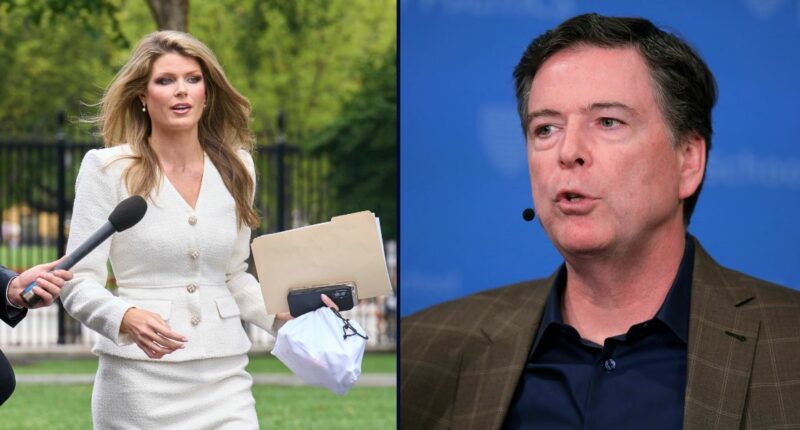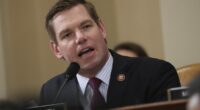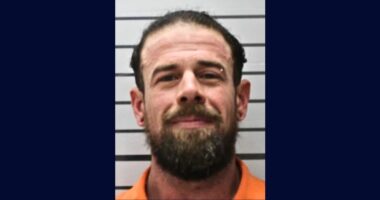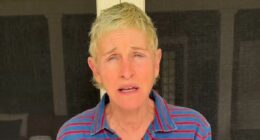Share this @internewscast.com
Left: Lindsey Halligan, special assistant to the president, speaks with a reporter outside of the White House, Wednesday, Aug. 20, 2025, in Washington. (AP Photo/Jacquelyn Martin). Right: Former Director of the Federal Bureau of Investigation James Comey gestures while addressing a gathering at Harvard University”s Institute of Politics’ JFK Jr. Forum in Cambridge, Mass., Monday, Feb. 24, 2020. (AP Photo/Charles Krupa).
When I initially penned an article for Law&Crime on September 30, discussing the implications of James Comey’s indictment, I underestimated just how tenuous the government’s case against the former FBI Director truly was.
The indictment claims that Comey misled and obstructed Congress during his September 2020 testimony before the Senate Judiciary Committee. During this hearing, he was questioned about whether he had authorized any FBI personnel to serve as anonymous informants for media outlets covering the Russian election interference investigation.
In recent developments, Erik Siebert, the interim U.S. Attorney for the Eastern District of Virginia, faced mounting pressure from the Trump administration to move forward with charges against Comey. Siebert was reportedly hesitant, likely because he and his office deemed the case weak and lacking substance. He expressed his concerns regarding the case’s viability through a memo that declined prosecution.
However, on September 19, President Trump expressed his discontent with Siebert, stating that he wanted Siebert “out.” Siebert tendered his resignation that very day. The following day, in a social media post, Trump called upon Attorney General Pam Bondi to appoint a new replacement for Siebert and to initiate charges against Comey, New York Attorney General Letitia James, and California Senator Adam Schiff. Trump emphasized the urgency, stating, “we can’t delay any longer.”
This public declaration from the president has proven to be an ongoing advantage for Comey. As the Jeffrey Epstein scandal unfolded, forcing Trump to comply with Congress’s demands for the release of investigative files, the president openly urged Bondi to target “Democrats” associated with Epstein.
Nevertheless, Bondi had declared months earlier that there would be no further criminal charges stemming from the Epstein investigation.
Her response to Trump’s post: “Thank you, Mr. President. SDNY U.S. Attorney Jay Clayton is one of the most capable and trusted prosecutors in the country, and I’ve asked him to take the lead. As with all matters, the Department will pursue this with urgency and integrity to deliver answers to the American people.”
Comey’s attorneys, as expected, have asked the federal judge overseeing the case to dismiss the charges against him because they were politically motivated, a vindictive prosecution against a political enemy of the president.
According to Politico, one of Comey’s lawyers, Michael Dreeben, a former deputy solicitor general who has argued more than 100 cases before the U.S. Supreme Court, seized on Trump’s post and Bondi’s acquiescence.
In a hearing this week, Dreeben spent an hour laying out why the court should conclude that the indictment against Comey was brought solely because of Trump’s “personal animus” toward Comey.
To no one’s surprise, Dreeben pointed to Bondi’s recent kowtowing to Trump on yet another call for political retribution. “We have never before seen in this country a blatant use of criminal justice to achieve political ends,” argued Dreeben.
How can things possibly get worse for the Comey prosecution? Well, let me tell you. When Trump fired Seibert, Lindsey Halligan was appointed interim U.S. attorney. With literally no experience in criminal law, Halligan was forced to seek a grand jury indictment before the statute of limitations on Comey’s alleged crimes expired on Sept. 30, 2025.
Apparently, the novice prosecutor who was charged with getting an indictment against a former director of the FBI may have made some mistakes. First, during the hearing, Halligan allegedly misrepresented to the grand jury that Comey could not exercise his Fifth Amendment right to remain silent. I don’t know if that is a fatal error, but anyone who has a television knows that suspects and defendants — real or written into a crime drama script — have “the right to remain silent.”
The more interesting problem, one that Halligan admitted in court on Nov. 19, is that apparently not all grand jurors had an opportunity to review the two-count indictment, approved after the grand jury rejected one of the counts in the initial three-count indictment.
U.S. District Judge Michael Nachmanoff briefly asked Halligan to answer some questions. He told Halligan, “You’re counsel of record. You can address the court,” asking her to explain whether any grand jurors beyond the foreperson were present when the original indictment and a narrower substitute were presented to a magistrate judge.
“The foreperson and another grand juror was also present,” Halligan said, apparently confirming that a significant majority of jurors did not see the second indictment.
According to Politico, the judge said he “just wanted to make sure” that the indictment had not been seen by the full grand jury. Again, Halligan confirmed that it had not.
The prosecution of Comey appears to be in serious jeopardy. Nachmanoff could rule as early as next week.
Matthew T. Mangino is of counsel with Luxenberg, Garbett, Kelly & George P.C. His book The Executioner’s Toll (2010) was released by McFarland Publishing. He is a regular contributor to Law & Crime. You can reach him at www.mattmangino.com and follow him on Twitter @MatthewTMangino
This is an opinion piece. The views expressed in this article are those of just the author.















